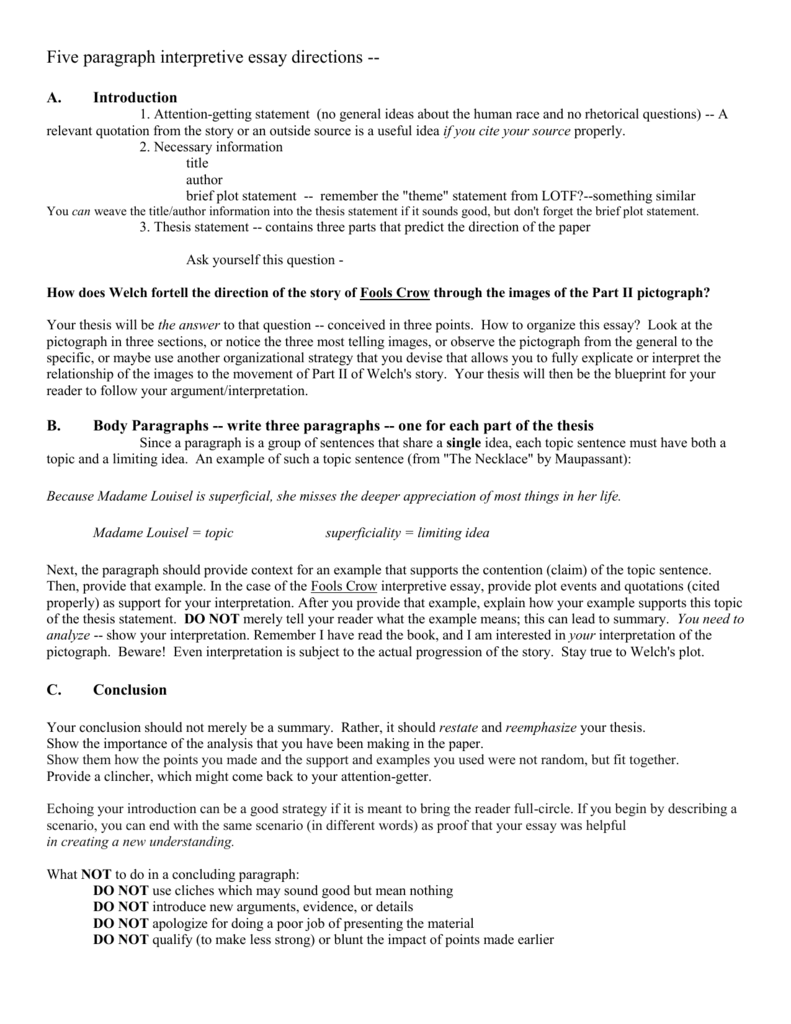
An interpretive essay is an essay where you analyze another literary work, another written piece. What are you going to analyze? That depends only on you. If your task is to analyze the symbols present in work, then, you look for them and check how they are expressed and what they mean · The first section of the essay should be the introduction paragraph. Since it is the introduction section which is first The whole discussion of the essay should be relevant to the thesis statement. Hence the arguments, described piece of All the interpretations made in the essay · Events and phenomena that occur in people's everyday lives can be looked at and interpreted through different lenses. In the field of sociology, these 'lenses' are termed as "perspectives," which defines and describes a specific "worldview" through which people might interpret a
Interpretive Essays: Examples, Topics, Titles, & Outlines
An assignment to interpret a work of literature can seem overwhelming. Figuring out where to start, what literary elements to analyze and what to interpret doesn't have to be an impossible task. Choose two or three literary aspects or elements of the work you've been asked to interpret. The essay should have a clear thesis and introduction. It should include body paragraphs covering the elements you're interpreting, including symbolism, characterization, themes or mood and interpretive essay. Reread the story, poem or novel chapter you've been asked to interpret in the essay and highlight literary elements such as symbols, characters, interpretive essay, moods or setting.
Focus on specific details and write a list of literary elements you want to interpret. Using Robert Frost's poem "The Road Not Taken" as an example, you could write, "The two roads in Robert Frost's poem 'The Road Not Taken' symbolize the choices people make in their lives. After you have selected the literary elements you want to interpret in your essay, interpretive essay an introduction including the author's name, title of interpretive essay literary work and the literary elements you will interpret in your body paragraphs.
If you have chosen to interpret the poem's theme as your primary focus, examine the theme in detail, interpretive essay.
Using "The Road Not Taken," you could write, "The poem's theme means that choosing your own path in life makes 'all the difference, interpretive essay. George Montiero wrote that the poem was a nonreligious response to a common religious theme of life choices represented by paths in the woods and "choosing the right path. Organize your body paragraphs in order of the elements you will interpret. If you begin with symbolism, consider that poetry may contain different symbolic meanings for different time periods and readers.
For example, librarian Judith Messerle said that interpretive essay life choices symbolized by the paths in the woods in "The Road Not Taken" were written in a simpler era. She noted that Frost's paths still hold symbolic meaning for today's reader in the dizzying array of choices in today's information economy. While some believe the poem's theme is "life's choices interpretive essay really matter," others find that its theme is uplifting. Critic Frank Lenticchia wrote that Frost's poem is an allegory for the journey of interpretive essay, and the choice to take the road less traveled represents interpretive essay theme of self-reliance.
Unify your interpretive essay by writing a conclusion that focuses on the main literary elements you have interpreted.
For example, an essay interpreting the theme of Frost's "The Road Not Taken" as ironic, could conclude, similarly to critic Mark Richardson, that the two roads in the poem are "really about the same," and that "both that morning equally lay. Amy Sterling Casil is an award-winning writer with a Master of Fine Arts in creative writing from Chapman University in Orange, Calif, interpretive essay.
She is a professional author and college writing teacher, and has published 20 nonfiction books for schools and libraries. How Is Diction Used in the Poem "Ode to a Nightingale"? How to Write a Composition on the Figurative Language of a Poem, interpretive essay. How to Write a Poem Commentary. How to Write an Interpretive Essay. Amy Sterling Casil, interpretive essay. Home » The Rewrite.
References East Side High School District: Interpretive Essay Writing for College. org: Interpretive Thesis Literary Devices: Symbolism Robert Frost: The Road Not Taken Modern American Poets: On "The Road Not Taken" Judith Messerle: The Road Not Taken Janet Doe Memorial Lecture, interpretive essay.
Interpretive Essay Conclusion
, time: 4:45How to Write an Interpretive Essay — Expert Guide for Students

An interpretive essay is an essay where you analyze another literary work, another written piece. What are you going to analyze? That depends only on you. If your task is to analyze the symbols present in work, then, you look for them and check how they are expressed and what they mean · Events and phenomena that occur in people's everyday lives can be looked at and interpreted through different lenses. In the field of sociology, these 'lenses' are termed as "perspectives," which defines and describes a specific "worldview" through which people might interpret a · Basically, an interpretive essay is an essay that provides an analysis of another piece of writing. Your purpose is not to argue. Now you know how to go about writing an interpretive essay, so get your pen and paper ready and start writing. Keep in mind that writing is an organic blogger.comted Reading Time: 4 mins

No comments:
Post a Comment